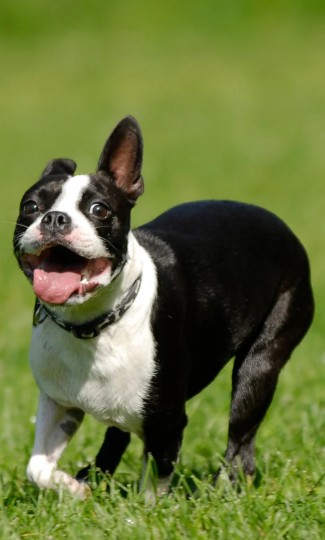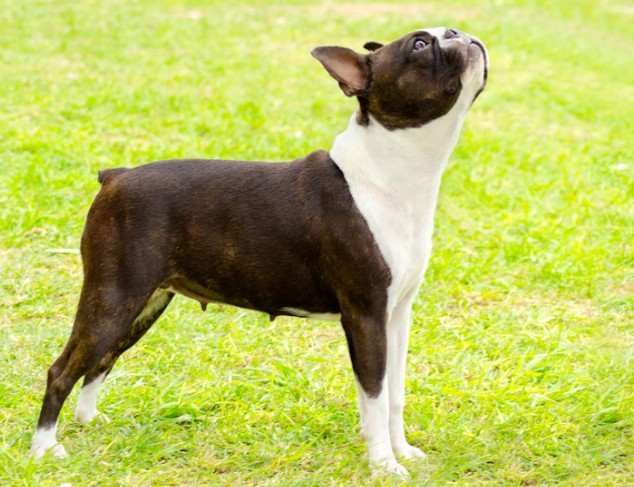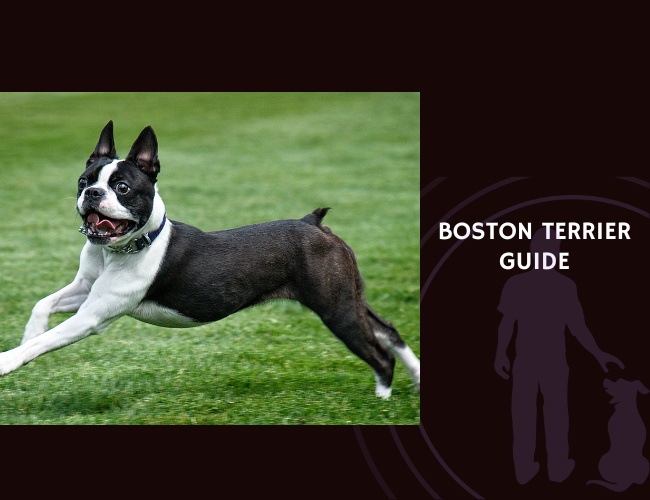Introduction to Boston Terriers
History and Origins
The Boston Terrier is proudly known as the “American Gentleman” thanks to its rich heritage and charming appearance. This lovable breed began its journey in the United States in the late 19th century, resulting from a cross between the English bulldog and the white English terrier. Originally bred in Boston, Massachusetts, these dogs quickly found favor due to their friendly demeanor and compact size, making them ideal city companions. Over the years, breeders further refined their looks and temperament, shaping the recognizable Boston terrier we adore today.
Physical Appearance and General Characteristics
Boston terriers stand out with their tuxedo-like coat, featuring unique black-and-white or brindle patterns. Their signature large, round eyes give them a sweet, expressive face, while their short, snub nose and perky ears add to their playful appearance. They typically weigh between 5kg and 12kg, making them sturdy yet manageable for most families. Boston terriers boast an athletic, well-proportioned body, paired with a short tail and slight muscles, reflecting their energetic nature. Their coat is smooth and easy to care for, which is a bonus for busy owners.
Why They Make Wonderful Companions
Boston terriers are celebrated for their affectionate and social traits 😊. They form strong bonds with their humans, thriving in interactive environments and looking to their family for guidance and comfort. Thanks to their even-tempered nature, they are known for being adaptable, playful, and patient—qualities that make them excellent companions for all ages. Their eagerness to please and moderate exercise needs make them a fantastic fit for urban and suburban homes alike, delivering both companionship and joy every day.
As we continue, you’ll discover even more about their personality and the unique ways they connect with people.
Character & Behaviour
Sociability and Bonding
Boston Terriers are known for their strong human connections. Longitudinal studies show that their oxytocin levels rise during positive human interactions, especially during puppyhood and adolescence. This highlights sensitive periods where bonding is most crucial. They typically show secure attachment styles, seeking out their humans for comfort and reassurance 😊. These dogs thrive in homes where companionship and gentle attention are part of daily life.
Playfulness and Emotional Control
These little dogs are lively and love playtime! Observational research reveals that Boston Terriers respond with tail wags and playful jumps when presented with new toys or environments. Their heart rate may spike with excitement, but many quickly adapt and self-regulate their emotions. Not every Boston Terrier is the same—some are more excitable, while others are calm. Positive emotional regulation makes them adaptable companions for busy households.
Sensitivity to Noise and New Environments
Boston Terriers are generally adaptable but may show sensitivity to sudden or loud noises. Studies that measure their reactions to urban sounds found that while some initially react with alertness or mild stress, most can adjust after brief exposure. Individual differences do exist—some may need additional reassurance during fireworks or storms. With gentle acclimation, they often become comfortable in various living spaces, from quiet homes to bustling city apartments.
Their sociable nature, playful demeanor, and adaptability make Boston Terriers enjoyable companions for different lifestyles.
Boston Terriers in Family Settings
Expressing Affection and Empathy
Boston terriers are true experts at showing love and empathy. They seek out eye contact, stay close to their trusted humans, and will often nuzzle or lick when they sense someone is upset. Video studies have shown that these dogs are very good at reading emotional cues, responding with gentle behaviors if their humans feel sad or stressed. Gaze patterns and proximity-seeking behaviors are common ways Boston terriers communicate their deep bond and care for their families. 😊
Stability in Multi-Dog Homes
When living with other dogs, Boston terriers usually show stable and predictable behavior. In temperament assessments, they adapt well whether they are the only dog or one of several in the home. Their adaptability means that, with proper introductions, they blend in easily and maintain a positive temperament. Stability is typically high if routines are consistent and each pet receives fair attention.
Interactions with Children and Family
Boston terriers are naturally gentle and playful, making them excellent with children. They thrive on gentle play and can match the energy of kids while still being mindful of boundaries. In multi-person households, Boston terriers form bonds with each member, giving attention to everyone and adjusting their interactions based on the person’s age and activity level. Their supportive and affectionate nature makes them wonderful companions for every member of the family.
With a loving environment and clear routines, Boston terriers develop strong family ties and fit seamlessly into busy households.
Training & Education Fundamentals
Understanding Boston Terrier Intelligence
Boston Terriers are bright and eager to please, but their working memory capacity has its limits. Short training sessions, focused on one command at a time, allow these dogs to shine. When given delayed-recall or object discrimination challenges, most Boston Terriers keep up well with simple tasks but may struggle if distractions are present or the task is too complex. Break lessons into easy steps for a supportive and successful experience 😊.
Motivational Drivers and Reinforcement
Reward-based learning works best for Boston Terriers. Studies show they respond most eagerly to food rewards, followed by playful games, and then praise. Treats with strong scents are especially helpful in capturing attention during training. Always use gentle encouragement and be consistent with your chosen reward. Diverse rewards like playtime or a quick cuddle can be motivating, but never rely on harsh corrections—this can cause anxious or resistant behavior.
House Training Strategies
Boston Terriers are generally quick to learn housebreaking rules when given clear guidance and regular routines. Establish a schedule for meals, potty breaks, and walks. Lead your pup to the same spot each time and reward them immediately after successful elimination. In urban environments, leash-walking is effective for reinforcing these behaviors. Patient, positive feedback, and a calm demeanor will help prevent accidents and confusion.
Using kind, clear communication sets a strong foundation for continued learning and healthy bonding.

Advanced Training Considerations
Communication clarity and handler responsiveness
For a supportive and successful training journey, communication between handler and Boston terrier must be clear and consistent. This breed does best with straightforward cues and positive feedback. Using hand signals along with verbal commands helps remove confusion. During training sessions, keep instructions simple and distinct. Avoid changing commands, as Boston terriers respond best to routines and repetition. If your Boston appears distracted, pause, ensure eye contact, and calmly repeat your cue. Gentle correction and immediate praise when they respond correctly go a long way in building trust and handler responsiveness 😊.
Suitability for canine sports and trick training
Boston terriers have a playful, energetic side, making them surprising stars in canine sports and trick training. Their compact bodies and fast reflexes suit agility courses, while their love for treats and games fuels their motivation to learn tricks. Training should be structured with short, engaging activities, as long or repetitive drills can lead to boredom. Varying the routine with new tricks and fun challenges keeps your Boston terrier mentally sharp and eager to participate. Remember, every success, no matter how small, should be celebrated with a cheerful “good job” and a tasty reward.
Overcoming breed-specific training challenges
Boston terriers sometimes face challenges due to their stubborn streak or their sensitive nature. If your dog seems stubborn, try switching up the motivator—some Bostons prefer toys over treats. Emotional sensitivity means harsh corrections can be discouraging; always opt for supportive, positive reinforcement to encourage effort. Noise or busy environments might distract your Boston terrier, so start training in a calm setting and increase distractions gradually. Patience, compassion, and a professional mindset will help your Boston terrier reach their full potential while strengthening your bond.
As you refine your training skills together, you’ll discover even more ways to understand and nurture your Boston terrier’s natural talents.
Nutritional Requirements
Managing Body Composition and Weight
Boston Terriers need careful body composition management. Because of their small frame, even a little extra weight can impact their health. Most Boston Terriers require 660–1320 calories each day, based on size, age, and activity level. Ensure meals have quality protein, healthy fats, and complex carbohydrates for balanced energy. Professional advice from a veterinarian helps tailor specific portion sizes and meal plans. Routine weigh-ins at home and scheduling body checks make early detection of weight gain easier.
Gastrointestinal Health and Flatulence
Gastrointestinal issues, especially flatulence, are common in the breed. Some foods, like high-fat diets or grains, may cause more gas or soft stools. Supportive feeding practices include choosing high-quality dog foods that are easy to digest, focusing on lean meats, and avoiding sudden diet changes. If you notice frequent gas or upset stomach, ask your vet about hypoallergenic or grain-free diets. These steps promote less discomfort and a healthier gut microbiota for your pup 😊.
Supporting Eye and Skin Health
The Boston Terrier’s eye and skin wellness are linked to nutrition. Including omega-3 fatty acids and vitamins in their diet supports corneal clarity, tear production, and itch-free skin. Consider foods or supplements with fish oil or flaxseed. Regularly check for redness or itchiness, as this could mean an imbalance. Proactive feeding leads to bright eyes and a shiny, healthy coat, supporting their active daily life.
Next, we continue exploring essential care considerations, ensuring every Boston Terrier feels their best, inside and out.
Feeding Practices & Considerations
Safe Feeding for Snub-Nosed Breeds
Feeding a Boston terrier means thinking about their flat faces. Their brachycephalic (short-nosed) shape can make eating tricky. For a supportive experience, use shallow bowls or raised feeders. These designs help your dog eat without pressing their nose into the dish, lowering the risk of choking. Kibble softened with water works well, and small, round pieces are less likely to get stuck. Always watch meals to make sure your terrier is eating safely and comfortably 😊.
Supplements for Joint and Cardiac Support
Boston terriers benefit from added nutritional support, especially as they age. Our professional team provides evidence that extra taurine and L-carnitine can help maintain heart function and lower the risk of heart disease in this breed. For joints, glucosamine and chondroitin are frequently recommended to support mobility and comfort. Before adding any supplement, check with your vet for precise dosing and if it’s right for your dog’s needs.
Meal Scheduling and Portion Control
A regular meal routine is key for healthy weight management. It’s informative to feed your Boston terrier 2-3 times a day instead of free-feeding. Measure each portion according to your vet’s advice—monitor your dog’s body condition and adjust as needed. This keeps their weight stable and supports digestion. Remember, smaller, more frequent meals are easier for their digestive system and help prevent overeating, keeping your Boston terrier happy and healthy.
Next, we’ll focus on keeping respiratory health top of mind for your Boston terrier.
Charming. Sensitive. Spirited.
Urban Companion. Compact, clever, and full of heart—Boston Terriers bring balance to modern life with their effortless blend of playfulness and poise. Their small frame may be unassuming, but their character fills the room with energy and charm.
Heart on Sleeve.
They don’t just live with you—they live for you. Tuned into emotion, expressive in affection, these dogs offer more than companionship: they offer connection. When you’re low, they notice; when you’re joyful, they reflect it right back.



Bold but Balanced.
From city streets to living room laps, Boston Terriers adapt with ease. Their energy is real, their devotion unwavering, their joy unmistakable. Behind their tuxedoed look lies a confident spirit that thrives on trust and routine.
Health Vulnerabilities: Respiratory System
Understanding Brachycephalic Obstructive Airway Syndrome (BOAS)
Boston Terriers are known for their adorable flat faces, but this brachycephalic (short-nosed) trait brings certain health challenges. The most significant risk is Brachycephalic Obstructive Airway Syndrome (BOAS). BOAS occurs due to shortened skull bones, which can lead to narrowed nostrils, an elongated soft palate, and a narrow windpipe. This can cause noisy breathing, snoring, and, in severe cases, labored breathing—especially during exercise or in hot weather.
Prevention Strategies and Management Techniques
Our professional team provides supportive advice to help minimize BOAS risks:
- Maintain a healthy weight for your Boston Terrier; extra weight can make breathing more difficult.
- Avoid strenuous exercise or play during hot and humid days—overheating stresses the airways.
- Use harnesses instead of collars for walks to reduce throat pressure.
- Provide short, gentle walks and let your Boston Terrier rest as needed.
If your dog shows frequent panting or snorting, or tires easily, these could be signs of airway obstruction. Simple lifestyle adjustments can make a big difference for their comfort and overall health.
When to Seek Veterinary Intervention
For a supportive experience, we recommend watching for warning signs: blue gums, fainting, persistent coughing, or major breathing difficulty. Should these symptoms appear, seek veterinary care immediately. In some cases, surgery may be needed to correct airway anatomy and ensure safe breathing for your Boston Terrier. Regular checkups are essential to catch potential issues early and build a healthy, happy life for your beloved companion. 😊
Next, understanding commonly affected areas ensures comprehensive care for your Boston Terrier.
Health Vulnerabilities: Eyes & Skin
Common Eye Issues in Boston Terriers
Boston terriers are known for their expressive eyes, but these big, beautiful eyes come with some risks. They are prone to corneal ulcers, dry eye (also known as keratoconjunctivitis sicca), and lens luxation. Corneal ulcers can happen if something scratches the surface or from accidental bumps during play. Dry eye occurs when the tear glands do not produce enough lubrication, making the eyes more likely to develop infections and discomfort. Catching these conditions early is key. If you notice cloudiness, redness, or discharge, schedule a veterinary check right away for professional support.
Preventative Eye Care
To help keep those precious eyes healthy:
- Wipe around the eyes daily with a clean, damp cloth.
- Avoid harsh shampoos during baths and use veterinarian-approved saline eye wipes.
- Schedule regular checkups – your vet can spot early signs of trouble.
Tear staining is another common but mostly cosmetic concern, so keeping the area clean helps with both comfort and appearance.
Allergies and Skin Sensitivities
Allergic reactions and atopic dermatitis are more common in Boston terriers than some other breeds. Triggers can include pollen, dust, household cleaners, or certain foods. Regularly check your pup’s skin for redness, hot spots, or signs of excessive scratching. Early intervention with vet-recommended shampoos, dietary adjustments, and prescribed medications can make a big difference.
Daily Habits for Healthy Eyes and Skin
For a supportive routine:
- Provide a diet rich in omega-3 fatty acids and vitamins.
- Bathe monthly with gentle, hypoallergenic shampoo.
- Moisturize dry patches as directed by your vet.
A little daily care can keep your Boston looking and feeling their best 😊.
Boston terrier wellness is about proactive attention and small, positive routines.

Other Health Considerations
Cardiac screening and inherited heart conditions
Boston terriers, though sturdy and energetic, can develop certain inherited heart issues. For a supportive experience, owners are encouraged to schedule regular cardiac screenings. Echocardiography and other diagnostic tools help detect heart murmurs or congenital conditions early. Boston terriers are known to be at risk for heart murmurs caused by genetic factors, and early detection allows for better management with diet or medication if needed. Signs such as coughing, fatigue, or exercise intolerance should be discussed with your veterinarian.
Orthopedic risk factors in compact breeds
Like many compact breeds, Boston terriers may experience orthopedic risks. Our professional team provides guidance on patellar luxation (kneecap dislocation), hip dysplasia, and spinal concerns. These may occur due to genetics or injury. Watch for signs such as limping or hesitation to jump. Maintaining an ideal body weight and offering joint-supporting supplements like glucosamine can promote joint health and minimize stress on their skeletal system.
Regular health screening recommendations
A comprehensive, supportive health routine for Boston terriers includes scheduled veterinary assessments. Annual checkups should cover heart health, orthopedic exams, and screening for common inherited diseases. This helps identify any emerging issues early and keeps your Boston terrier bouncing, healthy, and happy 😊. Preventative care, including dental and allergy evaluations, completes the holistic approach to their lifelong wellness.
Next, we’ll explore lifestyle choices and home environment factors that further support your Boston terrier’s wellbeing.
Lifestyle & Environmental Needs
Urban Adaptability and Small Living Spaces
Boston Terriers shine as city dwellers. Their compact size and easy-going personality make them well-suited for apartments or smaller homes. Many owners report that Boston Terriers tolerate elevator rides, confined spaces, and regular walks on busy sidewalks with ease. While they may startle at loud city sounds, most adjust smoothly over time with gentle, positive introductions to new noises and routines.
Exercise Needs and Suitable Activities
Though Boston Terriers have bursts of energy, they do not require endless amounts of exercise. Daily walks (20–40 minutes) and a bit of playtime—like a game of fetch or tug—are enough to keep them happy and fit. Indoor play is effective for rainy days. However, always watch for signs of overheating, as these pups can struggle in the heat. Mental activities, such as puzzle toys or learning simple tricks, are also a big hit for Boston Terriers.
Social Life in Multi-Human Homes
Boston Terriers enjoy being with people and form bonds across the whole family. They spread their affection evenly, making them natural in houses with multiple caregivers. When one person is busy, they’ll happily find another lap or playmate. This adaptability means they handle changes and shifting routines well. Regular positive interactions help Boston Terriers thrive and maintain emotional stability, no matter how many people come and go.
With a flexible attitude and loving spirit, Boston Terriers find joy in a variety of homes and routines, making them a wonderful addition to many lifestyles. 😊
Special Care Considerations
Temperature Regulation and Climate Sensitivity
For a supportive experience, it’s important to know that Boston Terriers can be quite sensitive to temperature changes. As a brachycephalic breed (meaning they have short noses), they are less effective at cooling themselves through panting. Hot weather can put them at risk for heat stress or even heatstroke. When temperatures rise, walk them early in the morning or late in the evening and never leave them in parked cars. Indoors, keep them cool with fans or air conditioning. In colder months, Boston Terriers can get chilly easily due to their short coat, so dog sweaters and cozy bedding help. Always watch for shivering or excessive panting as signs they need support adapting to the indoor climate. 😊
Travel Considerations for Brachycephalic Breeds
Traveling with Boston Terriers requires a professional approach. Flights, especially in cargo holds, can be risky because of their sensitive breathing anatomy. Choose direct flights and always opt for in-cabin travel when possible. During car travel, provide proper ventilation and make frequent stops for water and potty breaks. A harness can be safer than a collar to avoid neck pressure. These supportive steps help make every journey more comfortable.
Aging Care and Senior Needs
As Boston Terriers age, their care routine should adjust with compassion. Senior dogs may need softer beds, joint supplements, and more frequent—but gentle—exercise. Regular veterinary checkups help monitor arthritis or heart health. Keep an eye on any weight changes or mobility issues. Emotional support is important as they may become more attached and need extra reassurance.
Focusing on their special needs helps Boston Terriers thrive throughout every stage of life.
The Boston Terrier as a Companion
Emotional Support and Benefits
Boston terriers excel at bringing joy and comfort into their owners’ lives. These dogs form deep bonds and have an instinct for picking up on human emotions. Whether you are having a stressful day or simply want some company, their affectionate presence—marked by gentle cuddles and attentive gazes—makes a real difference. Many owners notice their Boston terrier offers emotional support by sitting close, making eye contact, or nudging gently during moments of sadness or anxiety 😊. Questionnaire-based studies have shown that Boston terrier companionship often leads to improved wellbeing and reduced stress levels for their humans.
Integrating into Family Life
A typical day with a Boston terrier is full of routine and playful energy. They thrive on daily walks, short games of fetch, and plenty of family interaction. Boston terriers quickly adapt to daily schedules, eagerly joining in family activities from breakfast time to relaxing on the couch. Because of their sturdy but compact build, they fit comfortably into apartment or house living, adapting to both calm and busy homes. In multi-person households, they easily form connections with each caregiver, sharing affection and attention across the family.
Long-Term Relationships
Boston terriers are known for their loyalty and the strong, lasting relationships they build over the years. Their emotional intelligence helps them adjust as circumstances change—whether welcoming a new child, moving homes, or growing older. Lifelong companionship with a Boston terrier is filled with shared routines, understanding gestures, and a bond that only grows deeper with time. Their ability to give comfort, adapt, and express empathy makes them one of the most rewarding canine companions.
Ready to create an environment where your Boston terrier can thrive? Understanding their needs ensures a happy and healthy partnership for years to come.
Conclusion: Is a Boston Terrier Right for You?
Summing Up Boston Terrier Essentials
Boston Terriers are loving, adaptable, and social dogs. Their gentle temperament, quick learning, and playfulness make them perfect for singles, couples, families, and seniors. They flourish with routine, consistent attention, and positive motivation. However, owning a Boston Terrier requires commitment to daily care, emotional support, and frequent health screenings for common concerns like respiratory and eye issues. Their moderate energy means daily walks and play are a must, but they’re quite content in apartments or homes with small spaces.
Important Considerations for Owners
Before welcoming a Boston Terrier, consider these key points:
- Regular veterinary checkups for heart, eye, and joint health
- Weight management and portion-controlled feeding
- Mindful attention to breathing during exercise or warm weather
- Consistent routines, gentle training, and social time
- Additional care for travel and aging needs
Boston Terriers are affectionate, thrive on companionship, and can be emotionally intuitive. Be prepared to invest emotionally and practically—their loyalty is returned in full.
Where to Find Support and Information
For a supportive experience, reach out to reputable veterinarians, Boston Terrier breed clubs, or local rescues. Helpful resources can be found through breed-specific forums, training classes, and educational guides like this one. Community networks offer encouragement and advice for every step of your journey. 😊










